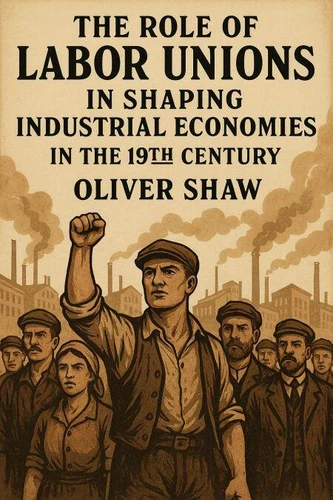The Role of Labor Unions in Shaping Industrial Economies in the 19th Century
Par :Formats :
Disponible dans votre compte client Decitre ou Furet du Nord dès validation de votre commande. Le format ePub est :
- Compatible avec une lecture sur My Vivlio (smartphone, tablette, ordinateur)
- Compatible avec une lecture sur liseuses Vivlio
- Pour les liseuses autres que Vivlio, vous devez utiliser le logiciel Adobe Digital Edition. Non compatible avec la lecture sur les liseuses Kindle, Remarkable et Sony
 , qui est-ce ?
, qui est-ce ?Notre partenaire de plateforme de lecture numérique où vous retrouverez l'ensemble de vos ebooks gratuitement
Pour en savoir plus sur nos ebooks, consultez notre aide en ligne ici
- FormatePub
- ISBN8230095415
- EAN9798230095415
- Date de parution18/04/2025
- Protection num.pas de protection
- Infos supplémentairesepub
- ÉditeurIndependently Published
Résumé
The Role of Labor Unions in Shaping Industrial Economies in the 19th Century by Oliver Shaw offers a comprehensive examination of the pivotal role that labor unions played in shaping the social, economic, and political landscape during the Industrial Revolution. The book delves into the rise of industrial capitalism and the subsequent formation of labor unions as a response to the exploitation of workers in rapidly expanding industries.
Shaw traces the development of key unions in sectors like textiles, mining, steel, and railroads, exploring their struggles for better wages, working conditions, and political rights. Through a combination of historical analysis, primary source quotations, and case studies, Shaw illuminates how labor unions were not only central to securing basic workers' rights but also to pushing forward significant legislative reforms that would later define modern labor laws.
The book also addresses the challenges unions faced, including resistance from employers, government repression, and the fracturing of the working-class movement. Shaw provides an insightful look at how labor unions laid the groundwork for the welfare state, impacting public policy, shaping the political ideology of the time, and influencing social reforms that continue to resonate today. This book serves as an essential resource for understanding the profound impact of organized labor on industrial economies and its legacy in the fight for workers' rights across the globe.
Shaw traces the development of key unions in sectors like textiles, mining, steel, and railroads, exploring their struggles for better wages, working conditions, and political rights. Through a combination of historical analysis, primary source quotations, and case studies, Shaw illuminates how labor unions were not only central to securing basic workers' rights but also to pushing forward significant legislative reforms that would later define modern labor laws.
The book also addresses the challenges unions faced, including resistance from employers, government repression, and the fracturing of the working-class movement. Shaw provides an insightful look at how labor unions laid the groundwork for the welfare state, impacting public policy, shaping the political ideology of the time, and influencing social reforms that continue to resonate today. This book serves as an essential resource for understanding the profound impact of organized labor on industrial economies and its legacy in the fight for workers' rights across the globe.
The Role of Labor Unions in Shaping Industrial Economies in the 19th Century by Oliver Shaw offers a comprehensive examination of the pivotal role that labor unions played in shaping the social, economic, and political landscape during the Industrial Revolution. The book delves into the rise of industrial capitalism and the subsequent formation of labor unions as a response to the exploitation of workers in rapidly expanding industries.
Shaw traces the development of key unions in sectors like textiles, mining, steel, and railroads, exploring their struggles for better wages, working conditions, and political rights. Through a combination of historical analysis, primary source quotations, and case studies, Shaw illuminates how labor unions were not only central to securing basic workers' rights but also to pushing forward significant legislative reforms that would later define modern labor laws.
The book also addresses the challenges unions faced, including resistance from employers, government repression, and the fracturing of the working-class movement. Shaw provides an insightful look at how labor unions laid the groundwork for the welfare state, impacting public policy, shaping the political ideology of the time, and influencing social reforms that continue to resonate today. This book serves as an essential resource for understanding the profound impact of organized labor on industrial economies and its legacy in the fight for workers' rights across the globe.
Shaw traces the development of key unions in sectors like textiles, mining, steel, and railroads, exploring their struggles for better wages, working conditions, and political rights. Through a combination of historical analysis, primary source quotations, and case studies, Shaw illuminates how labor unions were not only central to securing basic workers' rights but also to pushing forward significant legislative reforms that would later define modern labor laws.
The book also addresses the challenges unions faced, including resistance from employers, government repression, and the fracturing of the working-class movement. Shaw provides an insightful look at how labor unions laid the groundwork for the welfare state, impacting public policy, shaping the political ideology of the time, and influencing social reforms that continue to resonate today. This book serves as an essential resource for understanding the profound impact of organized labor on industrial economies and its legacy in the fight for workers' rights across the globe.























